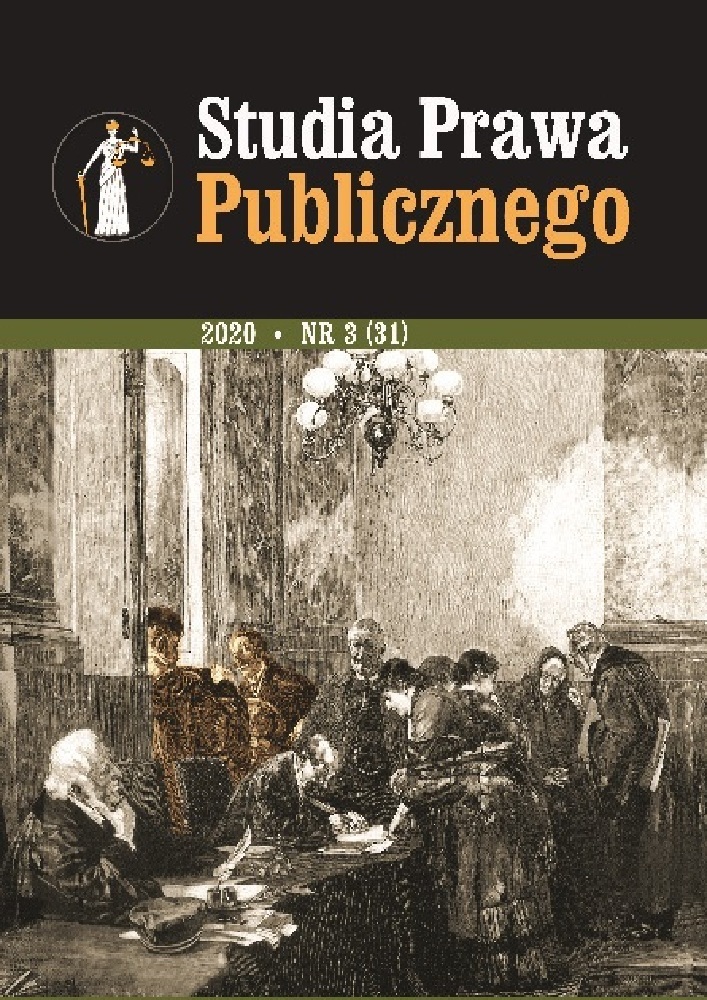Abstrakt
The Constitution of the Republic of Poland does not define in a comprehensive manner the matter to be standardized in laws and grants the legislator considerable freedom in determining their content. In view of the subject matter of this opinion, based on views founded on the doctrine of Polish constitutional law and on the jurisprudence of the Constitutional Tribunal and the Supreme Court, it can be concluded that the legislator should regulate by law, among other matters, the following matters reserved for statutory regulation (the principle of exclusivity of the act): regulations concerning citizenship and the rights, freedoms and duties of the individual, as well as the basic competences, principles of how public authorities are organised and function. On the basis of this assumption, it was examined whether there is any indication to the legislator from the constitutional norms relevant to the judicial authority. The following were taken into account: the right to a fair trial (Article 45), the principle of the separateness and independence of the judiciary (Article 173), the principle of bi-instantiality of court proceedings and the principle of statutory determination of the system and jurisdiction of courts (Article 176), the principle of the presumption of competence being assigned to common courts (Article 177), and the principle of the non-removability and non-transferability of judges (Article 180). On the basis of an analysis of these constitutional norms, it was concluded that the Constitution of the Republic of Poland enforces statutory regulation of the organisational structure and the material, local and appeal jurisdiction of common courts, and only allows for entrusting specific matters to be regulated by executive bodies by means of a regulation. In the event of any doubts as to whether a given case should be classified into the category of specific matters, the principle of exclusivity of the Act applies.
Bibliografia
Banaszak B., Uwagi o zgodności z Konstytucją znowelizowanego prawa o ustroju sądów powszechnych, „Przegląd Sejmowy” 2012, nr 5.
Czeszejko-Sochacki Z., Prawo do sądu w świetle Konstytucji Rzeczypospolitej Polskiej (ogólna charakterystyka), „Państwo i Prawo” 1997, z. 11.
Garlicki L., Komentarz do art. 176, w: Konstytucja Rzeczypospolitej Polskiej. Komentarz, t. 4, pod red. L. Garlickiego, Warszawa 2005.
Garlicki L., Omówienie tytułu rozdz. VIII, w: Konstytucja Rzeczypospolitej Polskiej. Komentarz, t. 4, pod red. L. Garlickiego, Warszawa 2005.
Garlicki L., Prawo do sądu, w: Prawa człowieka. Model prawny, pod red. R. Wieruszewskiego, Wrocław 1991.
Jabłoński M., Uwagi o ewolucji gwarancji niezawisłości i niezależności sędziów i sądów powszechnych, w: Studia nad prawem konstytucyjnym, pod red. J. Trzcińskiego, B. Banaszaka, Wrocław 1997.
Jaśkowska M., Konstytucyjnoprawne podstawy sądownictwa powszechnego i administracyjnego oraz delimitacja właściwości tych sądów, w: Aktualne problemy rozgraniczenia właściwości sądów administracyjnych i powszechnych, pod red. M. Błachuckiego, T. Górzyńskiej, Warszawa 2011.
Łętowska E., Łętowski J., Co wynika dla sądów z konstytucyjnej zasady trójpodziału władz, w: Konstytucja i gwarancje jej przestrzegania, Warszawa 1996.
Przysucha M., Czy minister sprawiedliwości może likwidować sądy?, „Gazeta Sądowa” 2000, nr 9.
Sarnecki P., Komentarz do art. 45, w: Konstytucja Rzeczypospolitej Polskiej. Komentarz, t. 5, pod red. L. Garlickiego, Warszawa 2002.
Trzciński J., Komentarz do art. 173, w: Konstytucja Rzeczypospolitej Polskiej. Komentarz, t. 1, pod red. L. Garlickiego, Warszawa 1999.
Zieliński A., Prawo do sądu a struktura sądownictwa, „Państwo i Prawo” 2003, z. 4.
Zieliński A., Prawo do sądu i organizacja władzy sądowniczej, w: Księga XX-lecia orzecznictwa Trybunału Konstytucyjnego, pod red. M. Zubika, Warszawa 2006.
Licencja
Prawa autorskie (c) 2020 Bogusław Banaszak

Utwór dostępny jest na licencji Creative Commons Uznanie autorstwa – Użycie niekomercyjne – Bez utworów zależnych 4.0 Międzynarodowe.
